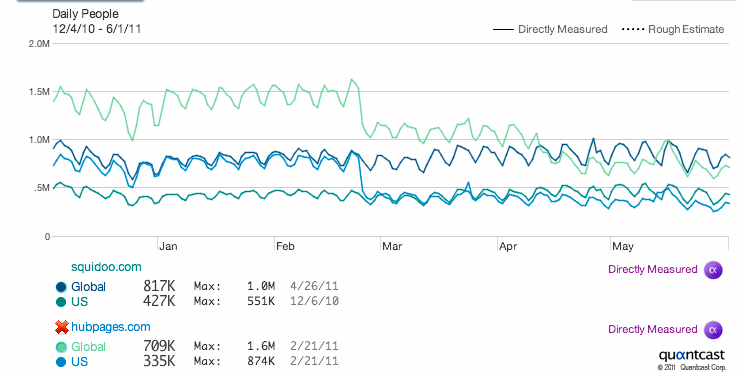By the way, Google reran the Panda algorithm again on about July 25.
What this means is that every month or so, someone at Google pushes the “Panda button.” Panda then reassesses the quality of content on each domain versus the amount of junk/spam on it, and gives that site, shall we say, a Panda Rating. That Panda Rating then becomes one of the factors Google’s everyday search algorithm uses to decide how well to list a page in search engine results. Panda’s rating is apparently a fairly strong factor, as traffic on each domain tends to rise or fall together, unless individual pages on that site have acquired enough other factors (say, backlinks from highly-respected sites) to offset the Panda factor.
Good news for Hubpages members: reorganizing Hubpages along subdomains has helped many of you, by partitioning off your content from spammy members’ content. That helps convince Panda to judge your content on its own merits versus that by other authors on the Hubpages domain. So Hubpages is now slightly outperforming Squidoo, ezinearticles, suite101, and other open publishing sites (as opposed to those vetting content with an editorial board, which Panda is going to like better). We can clearly see Hubpages getting an uptick from Panda 2.3 at the end of July:

Now, wait, why did I put DeviantArt on there? A hunch. Just look at all that traffic! I think Zazzle members should have a DeviantArt account where you showcase some of your work and link to your Zazzle gallery and/or accounts on Squidoo and HP where you showcase more of your work.
DeviantArt has an advantage over sites like HP and Squidoo, as you see. A social community that appeals to a large niche market (share your art! writing! photography!) gets tons of traffic if search engines didn’t care diddly squat for it. Members market it by pointing friends, relatvies, and peers to their stuff. Search engine traffic, for DeviantArt, is a bonus on top of the social buzz it generates.
Now, don’t all run out and create DeviantArt accounts for the purpose of spamming DA with backlinks. That won’t help much for SEO purposes. DeviantArt does not let you link directly out to some other website. Instead, when you enter links on a DeviantArt page like your profile, it’s stored in in a special in-house format, which is deciphered by a script only when a user clicks that link.
For instance, here’s our friend Flynn the Cat on DeviantArt. Hover over that link in Flynn’s sidebar and see what the URL is:
http://www.deviantart.com/users/outgoing?http://www.squidoo.com/flynn_the_cat
I bet that Google, at least, is clever enough to detect the hidden URL in there and crawl it for indexing purposes: “Aha, there’s a webpage at http://www.squidoo.com/flynn_the_cat.” But indexing is not the same as ranking. This link probably doesn’t count as a backlink, when Google is checking backlinks as one of the factors it uses to decide how high up to list a page in search engine results.
So why bother with backlinks on DeviantArt, if they don’t count for SEO? Pages on Hubpages, Squidoo, etc get indexed / crawled pretty quickly anyway.
Because links have two audiences: (a) search engines, which may use that link to rank your page better in search engine results and (b) humans, who will click on links that look interesting or useful to them.
In this case, your target audience is (b), people.
When writing backlinks for people, you have to give something they’ll be interested in. On DeviantArt, if they see an excellent portfolio of art, photos, or other kinds of creativity, some visitors will follow your link to see more of your creative work hosted elsewhere. Note that just because DeviantArt itself has a huge amount of traffic doesn’t mean your account will. As with Twitter, Facebook, or other social sites, you’ll only get traffic if you participate in and/or post really good stuff that attracts a following.
But if you are an artistic person like Flynn here, and upload stuff regularly, you will attract a following. You could then direct some of that following to a Zazzle store, Squidoo gallery, or blog where you showcase your stuff.
By the way, Digg, StumbleUpon, and many social media sites create outlinks the same way as DeviantArt: they are stored in a non-standard, in-house format, and then a script untangles them and sends the user to the real link. So everyone measuring links from those social sites as backlinks is missing the boat. Those may help Google index a page, but they probably don’t count much as far as helping a page rank better. As with DeviantArt, those links won’t help much for traffic unless you’re an active, contributing member of those communities who has gained a following by frequently posting good stuff of the kind that community tends to like.















